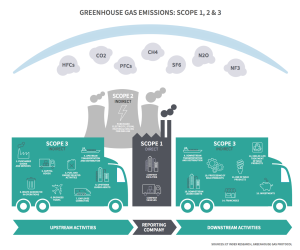Investor interest in climate disclosure continues to grow, yet only a tiny proportion of companies are reporting on their full value chain emissions. ET Index’s Olivia Seddon-Daines sets out an example of corporate leadership.
Corporate Citizenship’s report Getting on the right track underscored a very real and concerning misalignment between companies and their investors when it comes to material Environmental, Social and Governance (ESG) issues. As the report highlights, Corporate Responsibility professionals tend to treat investors as one homogenous group and are often “unaware of how the ESG information they disclose is used by their investors, what kind of ESG information investors are actually looking for and ultimately which ESG factors they then incorporate into their decision making processes”.
The world of investment is shifting with increasing numbers of large institutional investors publicly committing to integrate ESG factors into their decision-making processes. The UN-backed Principles for Responsible Investment (PRI) have, for example, been signed by more than 1,500 investors and managers, representing nearly $60trillion in assets under management.
This cohort is looking for, and scrutinising, information provided by investee companies on how particular ESG factors may affect their ability to generate value over the long term. However, when it comes to standard climate-related disclosures (e.g. Greenhouse Gas (GHG) emissions disclosure) companies have yet to meet the needs of this expanding audience.
ET Index Research is working to improve carbon accountability through its ET Carbon Rankings, the most comprehensive ranking of the world’s largest listed companies according to the carbon intensity of their activities. Company positions within the ET Carbon Rankings inform company weightings with the ET Low Carbon Index Series, which is used by investors to reallocate capital from carbon intensive to carbon efficient companies.
Over a 5 year period from 2011 to 2016, the ET Carbon Rankings have witnessed a slight increase in the number of companies reporting public and complete Scope 1 and 2 emissions data (3%). Scope 3 emissions typically account for 75% of a company’s carbon footprint and yet 98% of companies fail to complete a full Scope 3 inventory whereby all 15 Scope 3 categories are disclosed (2% of companies in the ET Carbon Ranking 2016).
Biogen, one of the world’s oldest independent biotechnology companies, ranked #2 in the 2016 Carbon Rankings. A leader within the sector of healthcare, Biogen has committed to ambitious scope 3 emissions reductions and already discloses 15 Scope 3 categories.
Action across the value chain – Healthcare
Starting to address sustainability issues holistically in 2008, Biogen has since achieved levels of efficiency unprecedented in the sector with successful execution of its sustainability strategy aiding its bottom line.
Biogen can be considered a powerful change agent, having signed up to the Science Based Targets Initiative which commits companies to setting carbon emissions reduction targets that are in line with a 2°C scenario. One of the criteria for having a target approved is that if a significant proportion of a company’s emissions are concentrated in its value chain, then the company must set an ambitious target to reduce these emissions too.
70% of the total emissions associated with Biogen’s business are found in its supply chain. For Biogen, this represents an opportunity to innovate, to work with its suppliers to reduce its emissions, to look at how to reduce the footprint of products once they are in use and to effect positive change across the whole industry.
Table 1: ET Global 800 Carbon Ranking 2016
| Top 10 | Company | Number of Scope 3 Categories Disclosed |
| 1 | BIOGEN INC | 15 |
| 2 | SANOFI | 15 |
| 3 | BAXTER INTERNATIONAL INC | 15 |
| 4 | COLOPLAST-B | 7 |
| 5 | TAKEDA PHARMACEUTICAL CO LTD | 6 |
| 6 | GLAXOSMITHKLINE PLC | 6 |
| 7 | DISCOVERY LTD | 4 |
| 8 | NOVARTIS AG-REG | 3 |
| 9 | AGILENT TECHNOLOGIES INC | 3 |
| 10 | AMGEN INC | 2 |
The full 2016 ET Carbon Rankings can be viewed online at etindex.com.
Conclusion
The ability to report on scope 3 emissions can serve as a proxy of a company’s communication with and understanding of its supply chain. Biogen provides a leading example of how the world’s largest healthcare companies can realise value from engaging with their supply chain to reduce Scope 3 emissions.
Failure to conduct and disclose a comprehensive Scope 3 inventory will increasingly raise questions in the minds of long-term investors: how well does an investee company really understand its supply chain?
Olivia Seddon-Daines is Investor Engagement Manager & Head of Policy at ET Index Research.







COMMENTS